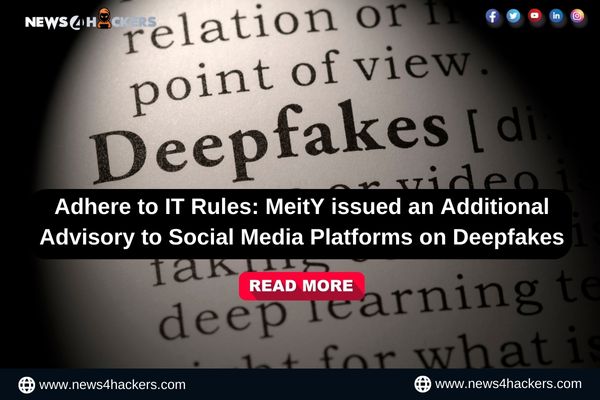Adhere to IT Rules: MeitY issued an Additional Advisory to Social Media Platforms on Deepfakes

Adhere to IT Rules: MeitY issued an Additional Advisory to Social Media Platforms on Deepfakes
The Minister of State for Electronics and Information Technology issued a warning to platforms, stating that “Consequences Under Law will Follow” if any violation of the IT Rules comes forth may result in legal penalties.

On December 26, the Ministry of Electronics and Material Technology (MeitY) issued a second warning to all social media platforms, encouraging them to adhere to the Information Technology (IT) Rules. This advice was prompted by growing concerns related to deepfakes and the dissemination of false material generated by artificial intelligence.
This recommendation follows two meetings convened by Minister of State for Electronics and Information Technology, Rajeev Chandrasekhar, with representatives from the industry, including social networking platforms, IT businesses, and legal professionals.

The warning emphasized the importance of informing users about the specific categories of content that are forbidden from being published in accordance with the IT Rules.
The advisory states that content prohibited by the IT Rules, specifically those mentioned in Rule 3(1)(b), must be clearly communicated to users in a straightforward manner. This should be done through the platform’s terms of service and user agreements. Users should be explicitly informed about these restrictions during their first registration and reminded regularly, especially during login and when uploading or sharing information on the platform.

According to Rule 3(1)(b) of the IT Rules, intermediaries are required to provide their rules, regulations, privacy policy, and user agreement in the language selected by the user. The rules mandate that platforms must make “reasonable efforts” to prevent users from engaging in any activity related to the 11 specified user harms or prohibited content on digital intermediaries, such as hosting, displaying, uploading, altering, publishing, transmitting, storing, updating, or sharing information.
The advice further emphasized that digital intermediaries have the responsibility to ensure that users are adequately informed about the legal consequences, including those outlined in the Indian Penal Code (IPC) and the Information Technology Act of 2000, in the event of violations of Rule 3(1)(b).

In November, MeitY issued an advisory to platforms, including social media businesses, reiterating their legal obligation under the IT Act 2000 and IT Rules 2021 to promptly delete such content from their sites.
In a statement on December 26, Rajeev Chandrasekhar, the Minister of State for Electronics and Information Technology, emphasized that misinformation poses a significant risk to the security and confidence of internet users. The utilization of AI-powered deepfake technology exacerbates the risks to the security and credibility of our digital citizens.

“On November 17, Prime Minister Narendra Modi informed the country about the risks associated with deepfakes. Following that, the Ministry has conducted two Digital India Dialogues involving all stakeholders of the Indian Internet. The purpose of these dialogues was to raise awareness among them regarding the provisions of the IT Rules, which were notified in October 2022 and amended in April 2023. These rules outline 11 specific types of content that are prohibited on all social media intermediaries and platforms,” he stated.
About The Author:
Yogesh Naager is a content marketer who specializes in the cybersecurity and B2B space. Besides writing for the News4Hackers blog, he’s also written for brands including CollegeDunia, Utsav Fashion, and NASSCOM. Naager entered the field of content in an unusual way. He began his career as an insurance sales executive, where he developed an interest in simplifying difficult concepts. He also combines this interest with a love of narrative, which makes him a good writer in the cybersecurity field. In the bottom line, he frequently writes for Craw Security.
READ MORE NEWS HERE






